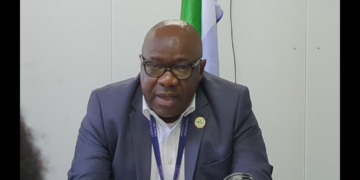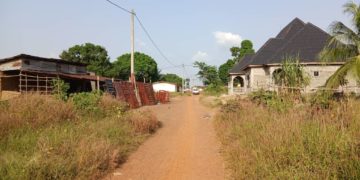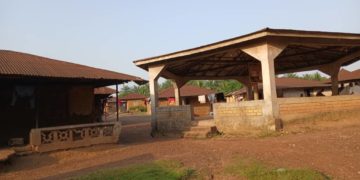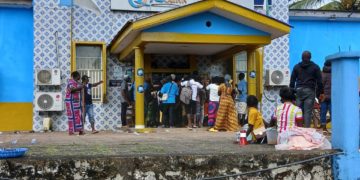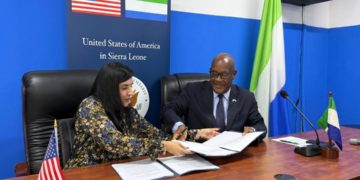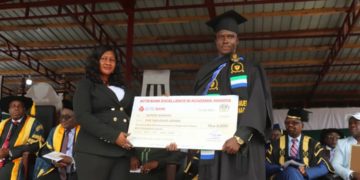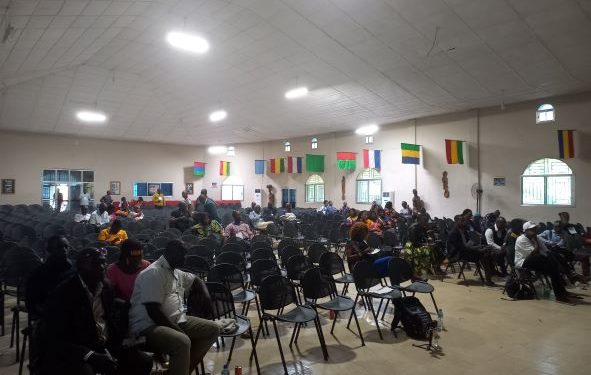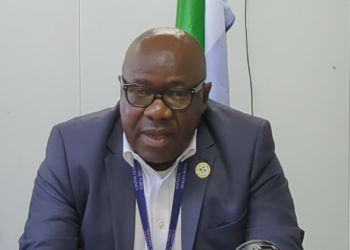A viable business model holds the key to a progressive and sustainable media, according to experts and industry leaders.
And this was the focus of this year’s Triennial Conference of the Sierra Leone Association of Journalists (SLAJ), which concluded in the northern city of Makeni on Sunday, June 19.
Leading journalists, communications and other experts argued that a media that depended on adverts, as it’s predominantly the case in Sierra Leone, is not only unsustainable but is also bound to fail in its cardinal responsibilities of promoting free speech and other democratic values.
Convened on the theme: ‘Towards an economically viable and independent media,’ the four-day event focused on lack of investment in the media and the impact on its independence. It brought together members of the umbrella journalist body from across country.
The Sierra Leone media has long been shrouded in poverty, which has largely been blamed for the decline in professionalism, a situation worsened by proliferation of media houses that are inadequately regulated.
“It is time for a forward looking posture to have a clear picture of where we want to be and we work to get there by all means,” says SLAJ President Ahmed Sahid Nasrallah.
The conference comes against the backdrop of several landmark developments in the media sector over the last four years, notably the repeal of the 1965 criminal libel law that campaigners said held back progress in the media for over five decades. Journalists and other citizens with critical views were arrested and jailed under the law for commenting or reporting on issues deemed offensive by powers that be.
Opponents of the defunct law said it provided a pretext for influential people to silence independent journalism.
Consequently, it kept potential investors away from the media, thereby starving it of much needed resources.
With the repeal of the law, SLAJ and its partners, including the government, saw a need to discuss potential investment opportunities.
The triennial conference followed a national media investment conference convened by the government in April. The Makeni deliberations were designed to take those discussions further.
“The media investment conference has opened our eyes to see the bigger picture. It is imperative we adopt new business models because certainly the ones we have been using all these years are not working,” said Nasrallah.
Usman Isiaka, Managing Director of the United Bank for Africa (UBA), one of the leading commercial banks in the country, was the keynote speaker at the Makeni triennial conference.
UBA is owned by Nigerian entrepreneurial giant and billionaire Tony Elumelu, who has dedicated his attention to promoting small and media sized enterprises.
According to Mr Isiaka, the bank operates on the principle of its owner, noting that they are open to proposals for potential investment. But he pointed out that the Sierra Leonean media must recalibrate and adopt acceptable business models that can appeal to investors.
“When you invest in the press you are actually investing in the development of your business,” he said.
The UBA boss elaborated on the correlations between ethical journalism and economic viability of the media, noting that while journalism that is based on lies can fetch one money in the short term, in the long run it fails.
“Ethical standard is key because no bank will want to give fund to a media entity that is always taken to court…Operating the media goes beyond reporting, it also involves strategic management,” stressed the Nigerian banker.
Despite the many concerns about the unprofessionalism in the Sierra Leonean media, some people believe that there is something to celebrate about it, like Paramount Chief Bai Shebora Kassanga II of Bombali Shebora Chiefdom, who said that journalism in the country is not what it used to be in terms of media practitioners holding power to account. But even PC Kasanga himself wants to see more from journalists.
“We look up to you,” he told delegates in the main auditorium of the University of Makeni (UNIMAK), where the conference took place.
Dr. George Gbamanja, Director of Academic Affairs at UNIMAK, chaired the opening ceremony of the conference. He said that journalists should remain faithful to the call to render “untainted” service to the masses by resisting temptations from outside forces.
Makeni City Mayor, Sunkari Kabba Kamara, said the theme of the conference was appropriate in that it spoke to “existential threat” faced by the news media, which has prevented it from operating as expected.
Donald Harding, a member of the Media Reform Coordinating Group, noted that poverty was such a major threat to the Sierra Leonean media that it has forced many practitioners to engage in unethical practices just to attract favours.
Data from the Independent Media Commission (IMC) depicts the exact nature of the effects of poverty on the Sierra Leonean media. IMC Chairperson, Dr Victor Massaquoi, said out of over 500 media entities registered with the regulator, only 40 percent were paid up. He spoke about the proliferation of fake news, which he said made their work difficult.
Among the many issues IMC is currently contending with is for employers in the industry to comply with the minimum wage. And for Dr Massaquoi, all that is part of efforts to promote professionalism by ensuring that journalists get a decent wage and avoid entrapments.
The goal, he stressed, “is to defend the right to free speech and at the same time protect the public from unethical journalism.”
A vibrant and independent media is one of the hallmarks of democracy and a right not just for media practitioners but for all citizens as well, said Juan Antonio Frutos, Head of Political, Press and Information Section at the European Union Delegation to Sierra Leone.
The EU has been a major partner of SLAJ in recent years, providing the association with funding to undertake several development projects. It also supports initiatives geared towards defending free speech and press freedom. Frutos reiterated the EU’s commitment to these causes.
“The media is essential in promoting human rights. But an independent media must also be viable, which is why there is need to device a way to address that. Financial independence is key,” he said.
Solomon Jamiru, Deputy Minister of Information and Communication, urged Sierra Leonean journalists to remember their colleagues in more difficult environment while exercising their rights to free speech, stressing the need to be constructive and to avoid fanning conflicts.

